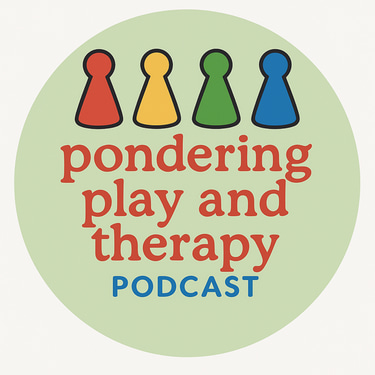Empathy and Attachment: A Conversation with Dr. Sharon Giblin
This week on Pondering Play and Therapy, I was joined by Dr. Sharon Giblin, a consultant clinical psychologist with over 25 years’ experience working with children and families. Together, we explored some of the most fundamental aspects of human connection—attachment, shame, guilt, and how empathy shapes our relationships across a lifetime.
Philippa with AI assistance
10/23/20252 min read


The Attachment Cycle: Building Brains and Bonds
Dr. Giblin explained how attachment begins before birth. Babies recognise the voice of their birth mother in the womb, and this familiarity lays the groundwork for connection. Once born, babies rely entirely on caregivers to meet their needs. The attachment cycle is simple but powerful:
The baby experiences a need (hunger, discomfort, tiredness).
They signal—through crying, wriggling, or later, words.
The caregiver recognises and responds.
The need is met, and the baby feels soothed and safe.
This cycle happens thousands of times a week. Each repetition wires the baby’s brain for trust, safety, and connection. Importantly, it isn’t about perfection—what children need is “good enough care”—predictable, consistent responses that help them feel secure.
When Attachment Is Disrupted
Not all children experience a steady rhythm of care. Illness, hospital stays, parental stress, or moving between carers (such as in foster care or adoption) can interrupt the cycle. Even when a baby is too young to “remember,” their body holds a felt sense of safety or insecurity. When needs aren’t consistently met, children may grow up struggling to trust that others will respond to them.
Shame and Guilt: Why the Difference Matters
Shame is a powerful early emotion. It whispers “I am bad” rather than “I did something bad.” Left unresolved, shame can become internalised, leading children to believe they are unlovable or unwanted.
With supportive caregiving, however, children can move from shame into guilt. Guilt says “I did something wrong, but I can repair it.” This shift allows children to take responsibility for their actions without collapsing into self-blame. Unfortunately, many of our behaviour management systems—think of the “naughty step” or being sent out of class—rely heavily on shame. For some children, particularly those with fragile attachments, this can deepen feelings of rejection rather than help them learn.
The Shield of Shame
When children feel overwhelmed by shame, their behaviour often reflects it. They may:
Deny wrongdoing (“It wasn’t me”).
Minimise (“It was just a little thing”).
Blame others.
Lash out in anger.
These reactions act as a shield to protect them from the painful feeling of shame. Yet ironically, they are also the behaviours that attract more punishment—trapping the child in a cycle of shame and consequence.
Parenting with PACE
So how do we help children—and teenagers—through these moments? Dr. Giblin reminded us of Dan Hughes’ PACE model:
Playfulness: finding moments of lightness and connection.
Acceptance: meeting the child where they are, without judgement.
Curiosity: wondering gently about what lies beneath their behaviour.
Empathy: showing that we feel with them and for them.
Boundaries and consequences are still needed, especially with teenagers, but if we approach them with PACE, we avoid compounding shame. Instead, we guide young people back towards connection and repair.
Final Thoughts
Listening to Dr. Giblin, I was struck again by how attachment is not just about infancy. It shapes us throughout life—through our friendships, our partnerships, and even how we parent. Shame, too, is universal, but with empathy and consistency, children can learn that their behaviour might sometimes miss the mark, but they themselves are still loved and safe.
That, I think, is the real heart of empathy in attachment: helping children carry the message that they are worthy of care, even when they stumble
